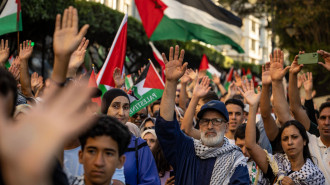Scores killed in Gaza as Israel strike on Islamic Jihad chief sparks rocket barrage
The targeted strike prompted a retaliatory barrage of almost 200 rockets fired into Israel, followed by Israeli air raids. Gaza's health ministry reported a total of 10 people killed and more than 40 wounded in the Palestinian enclave.
Israel said its airstrikes targeted Islamic Jihad militant sites as well as rocket-launching squads.
The rocket fire into Israel caused damage and a number of injuries, with at least one rocket hitting a house and another narrowly missing passing cars on a highway.
A factory in the city of Sderot was also hit, sparking a fire.
Israeli medics said they had treated 46 people, 21 of whom had "stress symptoms" related to the rocket fire.
Reports that a separate strike targeted an Islamic Jihad member in Damascus added to the day's tensions.
Islamic Jihad confirmed one of its officials, Akram Ajouri, was targeted, with Syrian state news agency SANA reporting an Israeli strike had hit Ajouri's home in Damascus, "killing his son Muadh and another person".
Israel did not comment on that strike.
The initial Israeli raid in Gaza early on Tuesday, thought to have been carried out by a drone, killed Islamic Jihad commander Baha Abu Al-Ata, 41 as well as his wife.
Israel blamed Ata for recent rocket fire into its territory and said he had been preparing further attacks.
As the retaliatory rocket fire followed, air raid sirens rang out in various parts of Israel as residents took cover in bomb shelters.
Read more: Baha Abu al-Ata: Who was the secretive Islamic Jihad leader assassinated by Israel?
Israel's military said on Tuesday night that some 190 rockets had been fired at its territory throughout the day, with dozens intercepted by air defences.
More than half of the rockets fell in open areas, it said.
Footage posted online showing the rocket that hit the highway near the central Israeli city of Gan Yavne, narrowly missing cars.
Schools closed
Islamic Jihad, allied to Hamas, the Islamist movement that rules Gaza, claimed responsibility for rocket fire from the Strip.
Schools were closed in both the Gaza Strip and in parts of Israel, including in the commercial capital Tel Aviv.
The Israeli army ordered "non-essential" workers in Tel Aviv, central Israel and the Gaza border region to stay home, banning public gatherings.
Prime Minister Benjamin Netanyahu charged that Ata had over the past year "planned and executed many attacks" and "fired hundreds of rockets at communities adjoining Gaza".
"Israel is not interested in escalation, but we shall do everything necessary in order to defend ourselves," he said in a televised statement from defence headquarters.
"I'm telling you in advance, it could take time."
Read more: Israeli airstrike on Damascus kills son of senior Islamic Jihad official
Mosque loudspeakers rang out with news of Ata's death early on Tuesday and crowds joined his funeral procession through the streets of the city, occasionally firing guns into the air.
A joint statement by Gaza's militant groups said Israel had crossed "all red lines" and would face consequences.
Hamas leader Ismail Haniya said "today's crime and the Israeli bombardment in Gaza are added to the Israeli criminal record that is intended to liquidate the Palestinian cause".
Politically sensitive time
Israel said Ata was behind rocket fire towards a music festival in the Israeli city of Sderot in August as well as further rocket attacks at the start of November.
It has also accused him of being behind sniper fire and drone launchings.
Ata "is responsible for most of the terror attacks in the last year from the Gaza Strip," the army said, describing him as a "ticking bomb".
It alleged he was "promoting preparations to commit immediate terror attacks in various ways towards Israeli civilians and (Israeli) troops during the recent few days".
The strikes and rocket fire raised the possibility of a severe escalation between Israel and Palestinian militants in Gaza.
They have fought three wars since 2008 and Gaza has been under strict Israeli blockade for more than a decade.
Islamic Jihad is the second most-powerful militant group in the Gaza Strip after Hamas.
The flare-up comes at a politically sensitive time for Israel.
A September 17 general election ended in a deadlock and a new government is yet to be formed.
It was the second election since April, when polls also ended inconclusively.
Follow us on Twitter and Instagram to stay connected!

![Palestinians mourned the victims of an Israeli strike on Deir al-Balah [Getty]](/sites/default/files/styles/image_684x385/public/2024-11/GettyImages-2182362043.jpg?h=199d8c1f&itok=xSHZFbmc)


![The law could be enforced against teachers without prior notice [Getty]](/sites/default/files/styles/image_684x385/public/2178740715.jpeg?h=a5f2f23a&itok=hnqrCS4x)
 Follow the Middle East's top stories in English at The New Arab on Google News
Follow the Middle East's top stories in English at The New Arab on Google News


![Left-wing candidate Jill Stein campaigns in Michigan in October [Getty]](/sites/default/files/styles/image_330x185/public/2024-11/GettyImages-2176828619.jpg?h=199d8c1f&itok=h2FXzBuP)